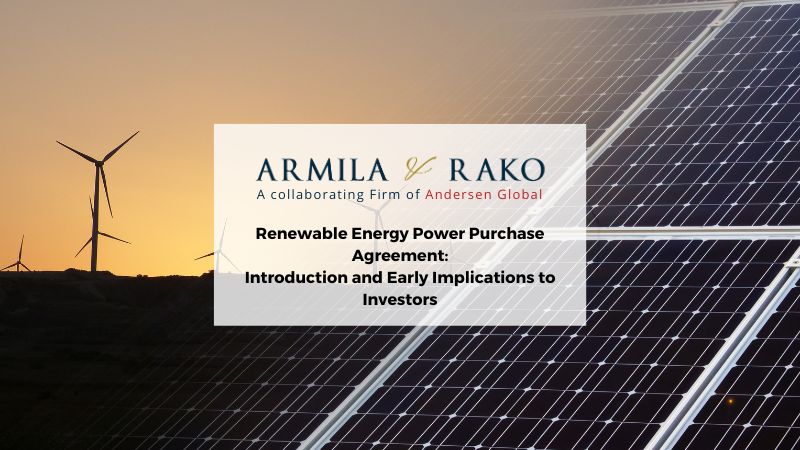Quick search
CTRL+K
Quick search
CTRL+K


Since 2010, the Global Law Experts annual awards have been celebrating excellence, innovation and performance across the legal communities from around the world.
posted 9 months ago
Discover Indonesia’s latest effort at energy transition by learning about the Ministry of Energy and Mineral Resources (MEMR) Draft Regulation concerning the Main Provisions of Power Purchase Agreements from Renewable Energy Independent Power Producers (Draft).
Indonesia’s Renewable Energy Transition
The Indonesian Government’s commitment to the Kyoto Protocol in achieving the Nationally Determined Contributions (NDC) from the electricity sub-sector is manifested in the national transition from fossil fuel to Renewable Energy (RE). To accelerate the NDC targets, the Government has issued Presidential Regulation No. 112 of 2022 (PR No. 112/2022). Accordingly, the Government has reserved a role for private investments as IPPs, wherein PLN is required to prioritize the purchase of electricity from renewable IPPs based on Power Purchase Agreements (PPA). This is referred to in Article 21 of PR No. 112/2022, which states that the guidelines for RE PPAs will be further regulated by the MEMR.
Impact of the Draft Regulation on Existing PPAs
Currently, RE PPAs rely on MEMR Regulation No. 10 of 2017 and MEMR Regulation No. 10 of 2018. This is especially alarming as such regulations only govern PPAs of conventional energy and may not properly answer the interests of RE PPAs. As a response, the MEMR has prepared the Draft to accommodate this issue.
In this early opportunity, we shall first highlight the impact of the Draft on parties that have signed a PPA and/or parties which are currently in the process of negotiation with PLN based on the previous regulations.
The Draft stipulates that its provisions do not act retroactively, so PPAs that were signed before the issuance of the Draft will still apply until its termination.[1] Furthermore, PPAs that are in procurement until the offering process shall adhere to the PPA guidelines as contained within the current regulations.[2]
The consideration of Power Purchase Agreements (PPAs) that have been signed or are currently being negotiated based on the Draft’s provisions, after its promulgation as a Ministerial Regulation, should take into account the absence of any explicit prohibition in the Draft. However, it is crucial to review these PPAs while upholding the principle of contract sanctity.
Business Scheme for Renewable Energy PPAs
The Draft stipulates that RE PPAs are valid for 30 years and could be extended with the costs under staging 2 without considering the value of the investment costs.[3] This provision raises some concerns, staging 2 itself is assumed to have been determined in PR No. 112/ 2022, however, the calculation under staging 2 is considered unfavorable for IPPs. Furthermore, the existence of additional investment costs for the obligation of electrical supply during the extension period (e.g., for the Battery Energy Storage System) for RE sources must also be accounted for.
MEMR Regulation No. 4 of 2020 determines the Build, Own, Operate (BOO) scheme for RE PPAs instead of Build, Own, Operate, Transfer (BOOT), however, the Draft does not mention this in any capacity. As such, the Draft may present freedom for stakeholders to determine their business schemes for RE PPAs, consequently failing in providing legal certainty and instead providing avenues for negotiations to place into effect the BOOT scheme that is otherwise only afforded to conventional energy PPAs, which is deemed to not provide bankability for RE IPP projects or may at least affect the length of time for negotiations.
Key Takeaways
As it is known, private investments in RE IPPs shall consider how will PPAs govern factors such as technology, climate risk, force majeure, and financial cost which will later be compensated by the purchase price of electricity. Nevertheless, to achieve the national energy mix target besides requiring PLN to purchase from renewable energy IPPs, Article 21 of PR No. 112/2022 also requires PLN to operate and develop its electricity generators that harness renewable energy sources, which thereby gives PLN the upper hand in the renewable energy electricity sub-sector. Given such situations, IPP investors hope for a specific regulatory framework that affirms the bankability of RE PPAs and ensures the legal standing of RE IPPs.
This article has been contributed by John Raoul Adithya and Bondan Waskitajati Nugroho of Armila Rako, a corporate law firm based in Jakarta. The above article does not, and is not intended to, constitute legal advice; instead, this article is for general informational purposes only. Information contained in this article may not constitute the most up-to-date legal or other information. Should the readers have any inquiries, readers can contact the authors at [email protected] and [email protected] Any reliance on this article is at the user’s own risk.
[1] Article 39 of the MEMR Draft Regulation concerning the Main Provisions of Power Purchase Agreements from Renewable Energy Independent Power Producers
[2] Article 40 of the MEMR Draft Regulation concerning the Main Provisions of Power Purchase Agreements from Renewable Energy Independent Power Producers
[3] Article 4 of the MEMR Draft Regulation concerning the Main Provisions of Power Purchase Agreements from Renewable Energy Independent Power Producers
Author


There are no results matching your search.
Resetposted 18 hours ago
posted 2 days ago
posted 2 days ago
posted 3 days ago
posted 5 days ago
posted 1 week ago
There are no results matching your search.
ResetFind the right Legal Expert for your business
Sign up for the latest legal briefings and news within Global Law Experts’ community, as well as a whole host of features, editorial and conference updates direct to your email inbox.
Naturally you can unsubscribe at any time.
Global Law Experts is dedicated to providing exceptional legal services to clients around the world. With a vast network of highly skilled and experienced lawyers, we are committed to delivering innovative and tailored solutions to meet the diverse needs of our clients in various jurisdictions.